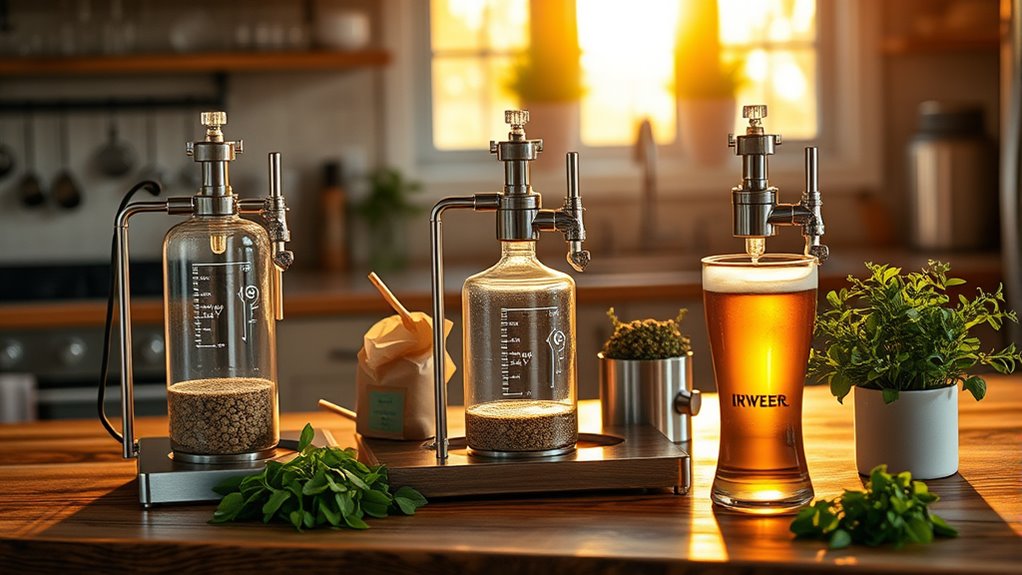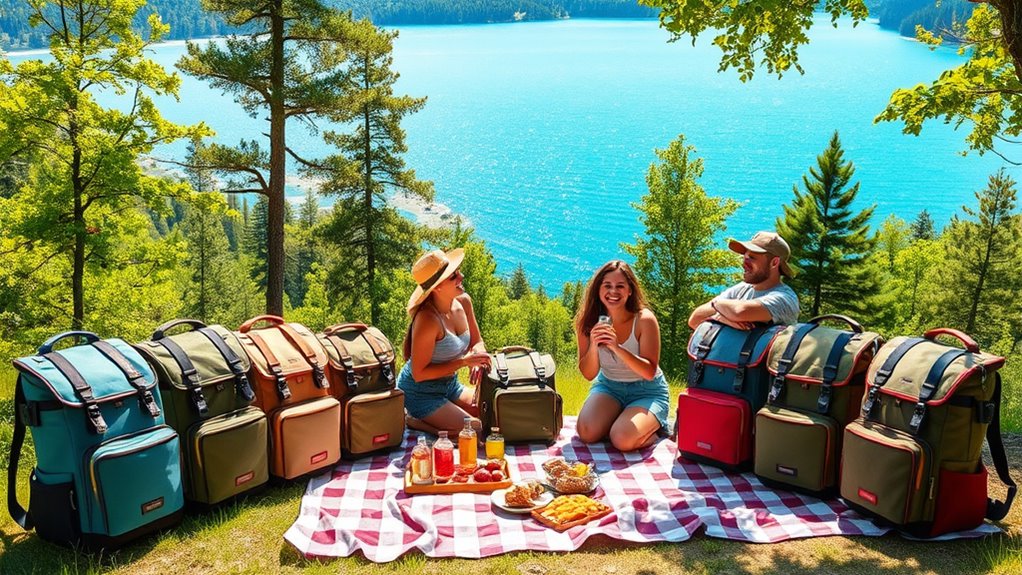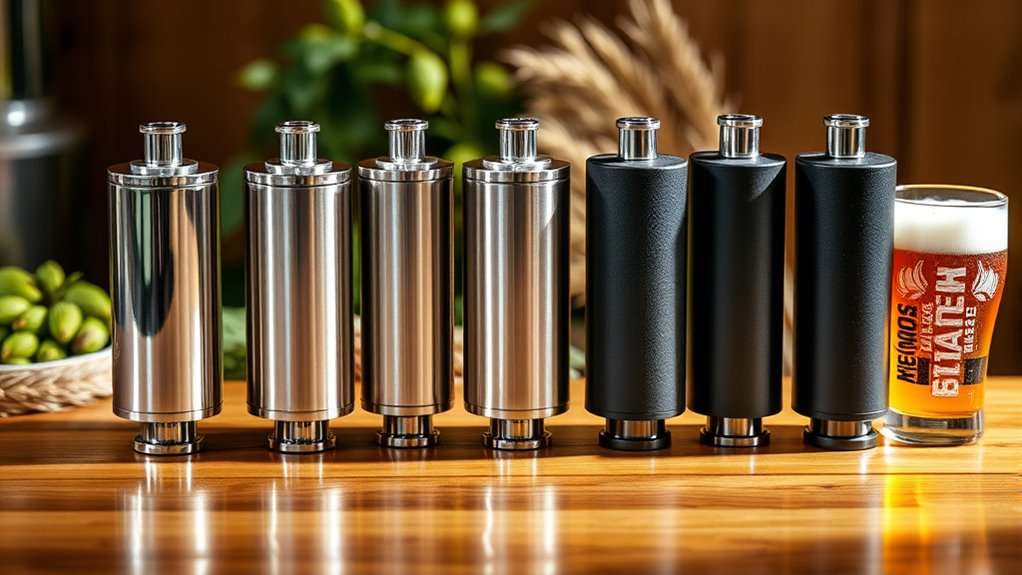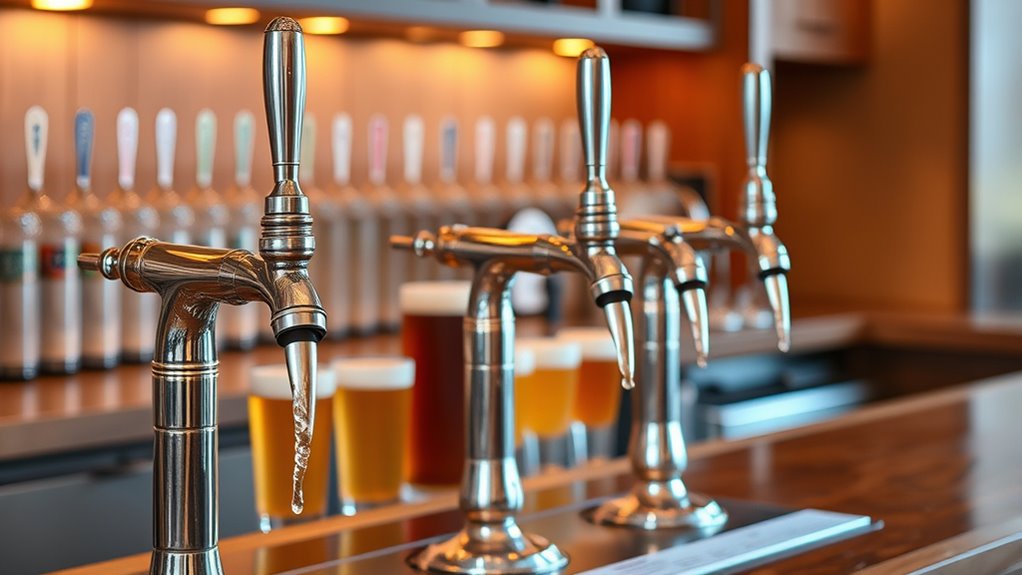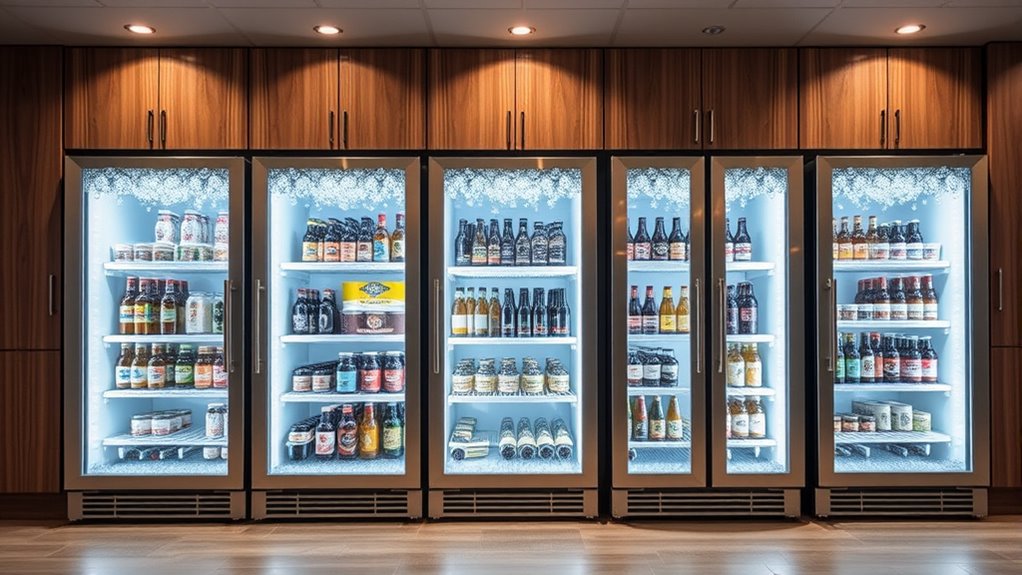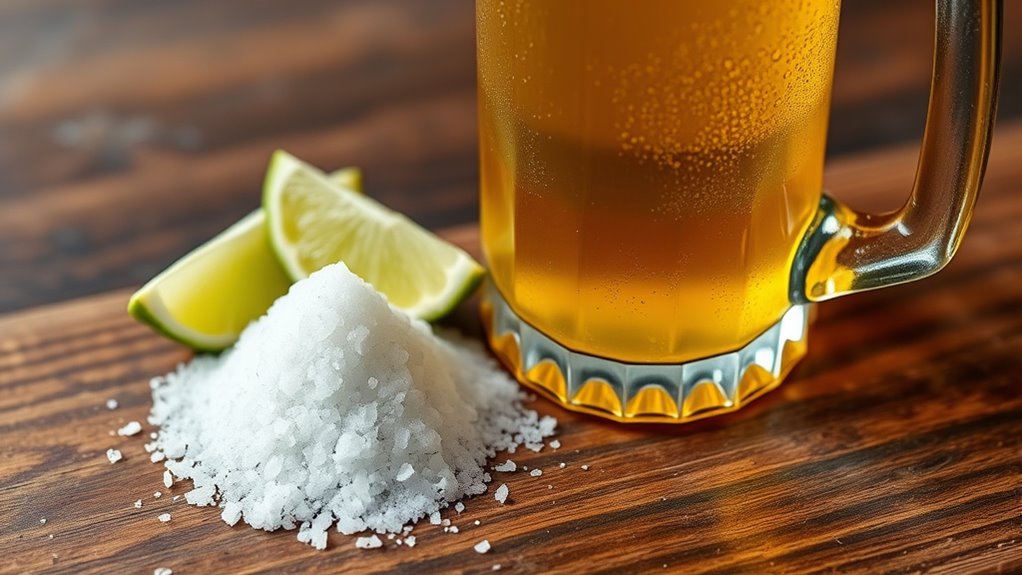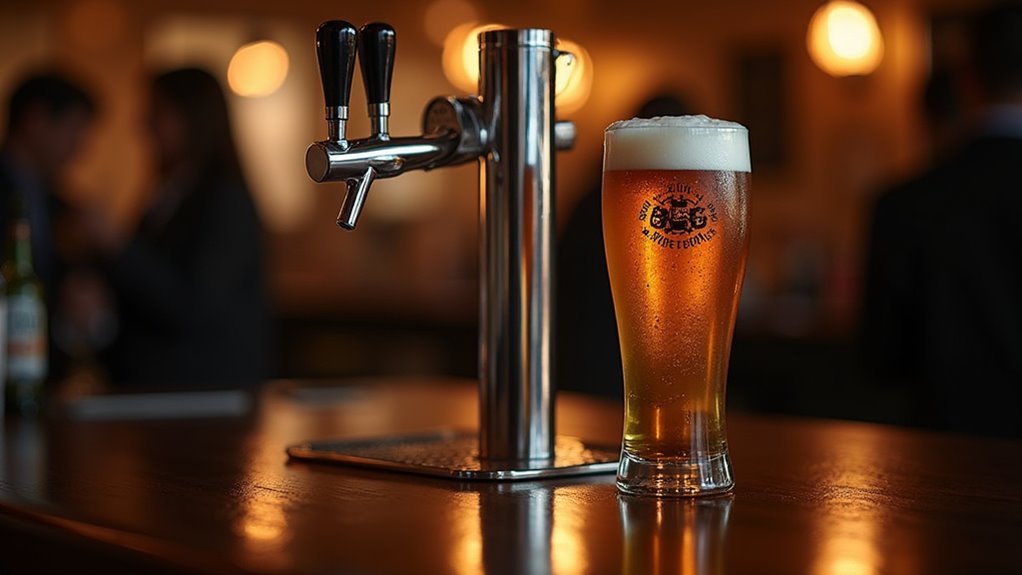If you’re looking to craft your perfect brew at home, consider the BrewDemon Premium Beer Making Kit, which features a patented fermenter and quick brewing time. The Northern Brewer All Inclusive 1 Gallon Starter Kit is great for beginners and comes with all necessary ingredients. For easy transferring, the Fermtech Mini 14 Long Deluxe Siphoning Kit enhances your brewing process. Each option offers unique benefits, helping you achieve your desired flavor profile. Explore more to find the right fit for you.
At a Glance
- BrewDemon Premium Beer Making Kit offers a patented fermenter and customizable recipes, brewing in as little as 15 minutes, ideal for busy beginners.
- Northern Brewer All Inclusive Kit includes essential tools, easy instructions, and ingredients for a popular IPA, though it lacks a hydrometer for ABV measurement.
- Fermtech Mini 14 Kit facilitates seamless transfer with high-quality materials, ensuring clean bottling but may pose cleaning challenges for users.
- Recipe Variety and customization options enhance creativity in brewing, allowing you to tailor flavors like fruits or spices for unique brews.
- Responsive Customer Support and thorough instructions are crucial for troubleshooting, enhancing user satisfaction and experience during the brewing process.
BrewDemon Premium Beer Making Kit with Bottles
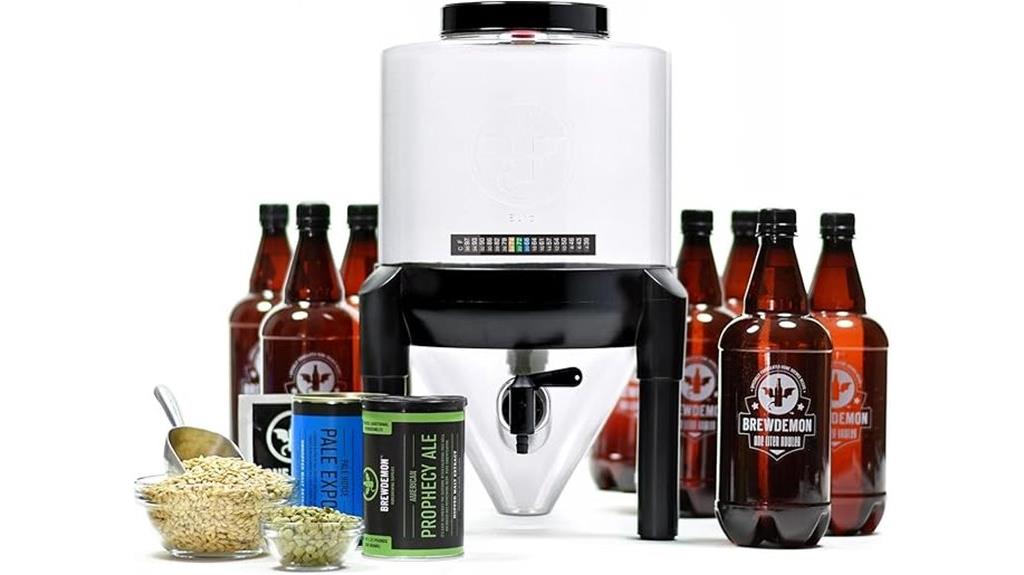
If you’re looking for an accessible and enjoyable way to try your hand at home brewing, the BrewDemon Premium Beer Making Kit with Bottles might be just what you need. This kit features a patented conical fermenter and a 2-gallon American Ale recipe, plus one-quart bottles and a filling valve. You can brew in as little as 15 minutes and customize your recipes by adding personal ingredients like apple or honey. With a focus on simplicity, you won’t need extra equipment. Although some users reported issues with packaging, BrewDemon’s customer service quickly resolves complaints, making it a popular choice among hobbyists.
Best For: Those seeking an easy and customizable home brewing experience without the need for additional equipment.
Pros:
- User-friendly design allows brewing in as little as 15 minutes.
- Encourages recipe customization with the option to add personal ingredients.
- Responsive customer service that addresses issues quickly.
Cons:
- Some users experienced packaging issues, such as scratched or dented bottles.
- The design lacks some functionalities found in competing kits, like an airlock.
- Limited number of bottles included in the kit may require additional purchases for full brewing potential.
Northern Brewer All Inclusive 1 Gallon Homebrewing Starter Kit
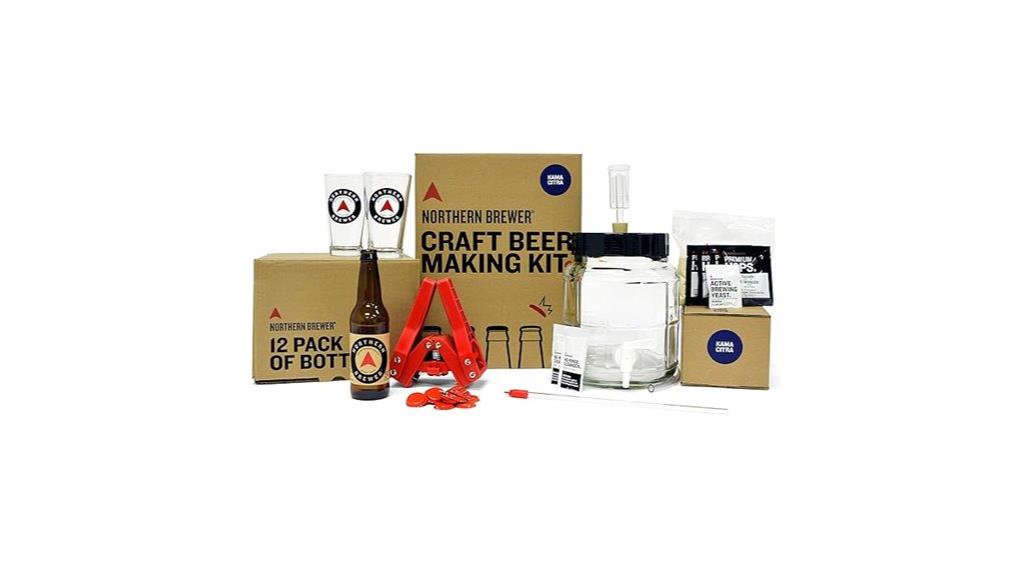
The Northern Brewer All Inclusive 1 Gallon Homebrewing Starter Kit is an excellent choice for beginners enthusiastic to try their hand at crafting their own beer. This kit includes everything you need to create a Kama Citra Session IPA, including fresh ingredients, 12 bottles, a capper, and sanitizer. You’ll find complete instructions available seven days a week, making the brewing process accessible. The carboy features a built-in pour valve for easy bottling, and many users appreciate its engaging brewing experience. However, some suggest adding a hydrometer for measuring ABV and improving the bottling method for better reliability.
Best For: Beginners looking to easily craft their own beer at home with an all-inclusive brewing kit.
Pros:
- Complete kit with all necessary ingredients and equipment for brewing a delicious Kama Citra Session IPA.
- Clear, accessible instructions available seven days a week support beginners throughout the brewing process.
- Engaging brewing experience that many users find enjoyable, resulting in good-tasting beer.
Cons:
- Lacks a hydrometer for measuring ABV, which would enhance the brewing experience.
- Some users prefer flip-top bottles over traditional caps for a more convenient bottling method.
- Reports of leaks in the spigot system that require sealing with silicone caulk for proper sanitation.
Fermtech Mini 14 Long Deluxe Siphoning Kit for Home Brewing
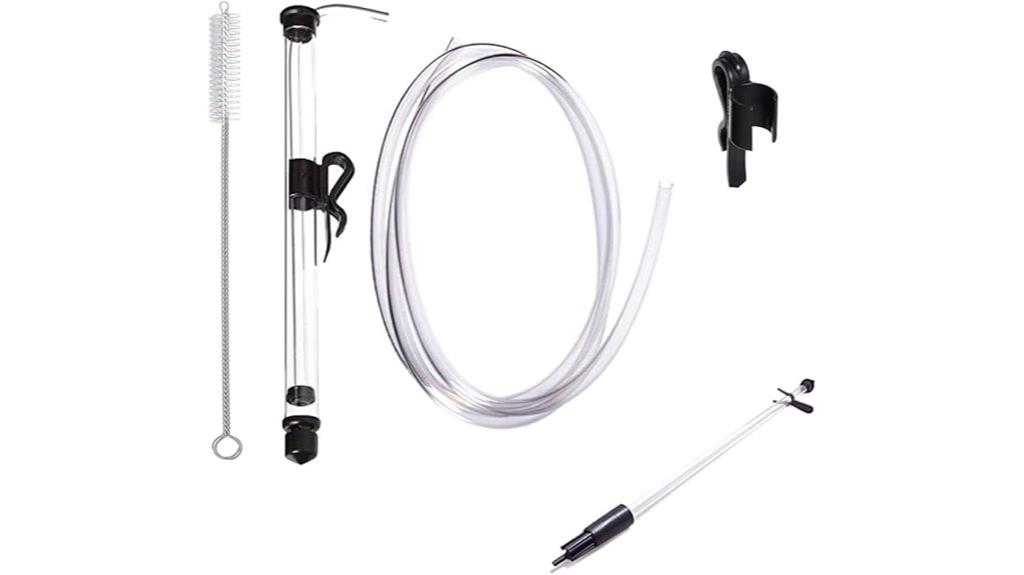
Experience the benefits of the Fermtech Mini 14 Long Deluxe Siphoning Kit, particularly designed for home brewers who want a seamless, reliable transferring process. This kit includes an auto siphon pump, food-grade transfer hose, and a bottling wand, making it perfect for transferring beer, wine, mead, and craft brews. With effortless siphoning, you’ll eliminate the hassle of traditional methods. The food-grade hose guarantees clean transfers, while the durable construction prevents leaks. It suits both beginners and experienced brewers, guaranteeing minimal oxidation during bottling. Rated 4.6 out of 5 stars, it’s a highly effective tool in your brewing journey.
Best For: Home brewers, whether novice or experienced, looking for a hassle-free siphoning solution for small batches of beer, wine, or mead.
Pros:
- Effortless siphoning with an auto siphon pump that starts with a single stroke.
- High-quality food-grade materials ensure clean and contaminant-free transfers.
- User-friendly design minimizes oxidation during bottling, perfect for maintaining flavor.
Cons:
- Some users report that cleaning the siphoning kit can be challenging.
- The 14-inch siphoning tube may not be suitable for larger batches.
- Limited warranty information available upon request.
Factors to Consider When Choosing At Home Beer Brewing Kits
When you’re choosing an at-home beer brewing kit, several factors play a vital role in your decision-making process. Consider the kit size and capacity, as well as the brewing time required to create your beer. Additionally, look at the recipe variety offered, equipment included, and how easy the kit is to use, as these will impact your overall brewing experience.
Kit Size and Capacity
Choosing the right kit size and capacity is essential for a successful at-home brewing experience. Home beer brewing kits usually range from 1 gallon to 2 gallons, which directly impacts how much beer you can produce. A 1-gallon kit typically yields about 9 bottles, making it ideal for casual brewers or those experimenting with new recipes. In contrast, a 2-gallon kit allows for larger batches, which can be more efficient if you plan to brew frequently. Consider your storage space, as larger kits need more room for fermentation and bottling. Ultimately, think about how often you want to brew and how much beer you wish to have on hand, as these factors will guide you in selecting the right kit size.
Brewing Time Required
Brewing time plays an essential role in your choice of at-home beer brewing kits, as it can greatly impact your overall experience. Brewing can take anywhere from 15 minutes to several hours, depending on the kit you select. Remember that fermentation usually lasts from a few days to several weeks, influencing the flavor complexity of your brew. When evaluating a kit, consider the total time commitment, which includes preparation, fermentation, and bottling, as this can affect how enjoyable the brewing process is for you. If you’re a beginner, opt for simpler kits that reduce complexity and keep brewing times manageable. Additionally, equipment with efficient features like built-in pour valves can speed up bottling and make the process more efficient.
Recipe Variety Offered
After you’ve considered the brewing time required for your at-home beer brewing kit, the variety of recipes included is another important factor to evaluate. Some kits offer unique or specialized recipes, like New Zealand ales or session IPAs, enhancing your brewing experience. Look for kits that allow recipe customization, so you can add fruits or spices for unique flavors. Kits may cater to different skill levels, offering easy-drinking beers or more complex flavor profiles. The number of recipes also matters; some kits provide only one, while others feature multiple options, increasing your chances for long-term enjoyment and experimentation. Additionally, access to supplementary recipes or brewing resources can help you explore various beer styles over time.
Equipment Included in Kit
When you’re considering at-home beer brewing kits, the equipment included can considerably affect your brewing experience. First, check the fermenter type; a conical fermenter enhances sediment reduction and simplifies cleaning. Next, verify the kit contains essential tools like bottles, caps, a capper, and sanitizer, which are vital for proper bottling and hygiene. Also, look for detailed and clear instructions to guide you through the brewing process, especially if you’re a beginner. It’s important to assess the brewing capacity, whether it’s 1-gallon or 2-gallon batches, to match your brewing volume needs. Finally, evaluate the materials used; high-quality food-grade components can greatly enhance your brewing experience and help you achieve a contaminant-free final product.
Ease of Use
Choosing the right at-home beer brewing kit involves considering how easy it is to use. Look for kits with clear, straightforward instructions, as user-friendly guides can really enhance your brewing experience, especially if you’re a beginner. Consider how much time you can dedicate; some kits let you brew in as little as 15 minutes, which is great if you have a busy schedule. Evaluate the included components; a thorough kit should have all necessary equipment and ingredients to minimize extra purchases. Make sure the brewing process is simple enough for you to follow without needing advanced equipment. Finally, check customer feedback to get insights about ease of use; high ratings often indicate enjoyable experiences and good-tasting results.
Quality of Ingredients
The quality of ingredients can make or break your at-home brewing experience, so it’s vital to pay attention to what’s included in your kit. Fresh, high-quality hops, malt, and yeast are essential for peak fermentation and great flavor. Choose kits that source these ingredients from reputable suppliers to guarantee the best results. Look for options that allow you to customize recipes, incorporating unique elements like fruits or spices that can elevate your brew’s taste. Handcrafted recipes, often developed by skilled brewers, may lead to a more balanced final product. Also, consider kits that are transparent about their ingredient sources, as this can give you confidence in their quality, resulting in a better brewing experience.
Price and Value
Ten key factors can help you assess the price and value of at-home beer brewing kits, ensuring you make an informed choice. First, check the initial cost of the kit; it should include all necessary equipment and ingredients to prevent hidden expenses. Next, analyze the yield of the kit, as larger volumes can offer better value per bottle than smaller options. Consider customization options that enhance your brewing experience without extra purchases. Look for customer satisfaction ratings and feedback, as they reflect overall reliability and value. Finally, factor in any additional costs for replacement parts or extra bottles, since some kits may have limitations that could lead to further expenses down the road.
Support and Resources
When exploring at-home beer brewing kits, it’s essential to take into account the support and resources available to you. Look for kits that come with thorough instructions and customer support systems designed to assist beginners. This can greatly enhance your brewing experience. Consider whether the manufacturer provides replacement parts and responsive customer service, which can address any problems you encounter seamlessly. Checking for additional resources like recipe ideas or brewing tips can inspire you to experiment and personalize your brews. Evaluate user feedback on the clarity of instructions and the level of support offered, as this directly impacts your satisfaction. Finally, easy access to online or phone support is crucial for troubleshooting as you navigate the brewing process.
Frequently Asked Questions
How Long Does It Take to Brew Beer at Home?
Brewing beer at home typically takes about two to four weeks. You’ll spend one to two weeks fermenting the beer, allowing yeast to convert sugars into alcohol. After fermentation, you’ll need another week or so for conditioning, which improves the flavor and clarity. If you’re bottling, allow additional time for carbonation. Overall, patience is key, as each step contributes to the final taste and quality of your homemade brew.
Can I Reuse Bottles From Store-Bought Beer for Home Brewing?
Yes, you can reuse bottles from store-bought beer for home brewing. Just make certain they’re clean and free from any residue or labels. Sanitize them properly to avoid contamination, which could spoil your brew. Inspect the bottles for cracks or damage, as these could affect carbonation. Reusing bottles is a great way to save money and reduce waste, but verify they’re suitable for your home brewing process to maintain quality.
What Ingredients Do I Need for Brewing Different Beer Styles?
To brew different beer styles, you’ll need key ingredients like malted barley, hops, yeast, and water. For lighter beers, use pale malts and floral hops. Stouts require roasted malts for a rich flavor, while IPAs benefit from a combination of bitter and aromatic hops. Don’t forget to adjust your yeast depending on the style; for example, use ale yeast for ales and lager yeast for lagers. This balance creates unique flavors in each brew.
How Do I Properly Clean and Sanitize Brewing Equipment?
To properly clean and sanitize your brewing equipment, start by thoroughly washing everything with warm, soapy water. Rinse well to remove all residue. Next, use a sanitizing solution, like potassium metabisulfite or Star San, to guarantee every surface is free of harmful microbes. Submerge or spray all parts, allowing them to stay wet for the recommended contact time. Finally, let the equipment air dry on a clean surface, making sure it stays untouched.
What Is the Ideal Temperature for Fermenting Beer?
The ideal temperature for fermenting beer is typically between 65°F and 75°F (18°C to 24°C). Ales usually ferment best at the higher end of this range, while lagers prefer cooler temperatures, around 50°F to 55°F (10°C to 13°C). Maintaining a consistent temperature is essential, as fluctuations can stress yeast and affect the flavor of your beer. Use a thermometer to monitor conditions closely during the fermentation process for best results.
